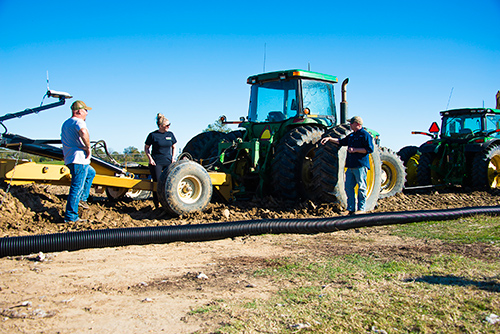State-of-the-art water management system gives MSU researchers tools for new regional agricultural solutions
Contact: Vanessa Beeson

STARKVILLE, Miss.—A new water management system installed at Mississippi State’s R.R. Foil Plant Science Research Center is elevating the university’s research capabilities as scientists develop solutions for farmers in Mississippi and across the Midsouth.
Advanced Drainage Systems, a leading manufacturer in drainage and irrigation, selected MSU as a Midsouth research site for the state-of-the-art water management system, which the company recently installed in a 10-acre field at the center, commonly referred to as North Farm. The system allows for field drainage and subsurface irrigation through a process known as pattern drain tile.
Darrin Dodds, professor and head of MSU’s Department of Plant and Soil Sciences in the College of Agriculture and Life Sciences, said the installation will allow scientists in the university’s Mississippi Agricultural and Forestry Experiment Station to enhance research solutions for growers in the region.
“While a few growers have adopted pattern drain tile in parts of east Mississippi, a system of this nature is very new to our state. We are uniquely positioned to evaluate not only the efficacy of drainage through this system but also study how it impacts aboveground and subsurface irrigation and water quality,” Dodds explained.
In 2021, the team will plant cotton in the field and evaluate drainage with subsurface irrigation, drainage with furrow irrigation and drainage alone across three trials.
“To the best of our knowledge, Mississippi State will be the only university in the southern U.S. that has a system such as this coupled with irrigation capabilities and the potential to monitor the effect of agricultural practices on water quality,” Dodds added
Jason Krutz, director of the Mississippi Water Resources Research Institute and plant and soil sciences professor, said he hopes the partnership will demonstrate a tool that saves producers money and improves water use efficiency.
“The project has the potential to alleviate two of the most critical limiting factors in the Midsouth—drainage and supplemental irrigation,” said Krutz, who noted the latter could help farmers in the Mississippi Delta, in particular, where one of the most intensively irrigated agricultural regions in the nation draws more than 90 percent of its irrigation water from the Mississippi River Valley Alluvial Aquifer.
While pattern drain tile gets its name from previous drainage systems that used cylindrical clay tiles, modern drain tile—including the MSU installation—uses corrugated plastic piping.
Darla Huff, Advanced Drainage Systems’ market manager for North America, said she hopes the research at MSU will establish a return on investment for Midsouth producers interested in installing the system.
“We know this system can increase yields of up to 30 percent across the Corn Belt and in the Upper Midwest, where much of 56 million acres of pattern drain tile in the U.S. is installed,” Huff said. “However, as someone who grew up in Louisiana and graduated from Mississippi State, I know agriculture in the South is completely different. Producers here need research and data from fields with similar soils and conditions as their own.”
Huff said she hopes the research conducted on the new system will provide just that.
“We understand the challenges farmers face when it comes to water management including drainage and irrigation. Adequate drainage allows farmers to get in the field sooner, pushing the planting window earlier in the spring. But there are questions, for example, of how much earlier can farmers plant? How much can a farmer save in irrigation costs? How does it impact water quality? These are questions we hope to answer through our partnership with Mississippi State,” Huff said.
For more information on MSU’s Department of Plant and Soil Sciences in the College of Agriculture and Life Sciences, visit www.pss.msstate.edu.
MSU is Mississippi’s leading university, available online at www.msstate.edu.